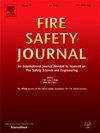Electric cooktop fire incidents in Finland
IF 3.4
3区 工程技术
Q2 ENGINEERING, CIVIL
引用次数: 0
Abstract
Cooking related fires contribute to one-fourth of residential building fires in Finland. However, their prevalence is often underestimated in statistics due to underreporting when individuals manage situations without fire service assistance. Despite their significance, cooktop fires remain inadequately studied, impeding our understanding of residential fire safety and the advancement of effective prevention measures. This study aims to provide a comprehensive evaluation of electric cooktop safety in Finland. It explores factors undermining safety, analyses materials contributing to hazards, assesses financial damages, and scrutinizes typical cooktop fire scenarios and prevention methods. Utilizing data from statistics (2016–2022), Safety Investigation Authority reports (1998–2022), media reviews (1.7.2020–30.6.2023), and insurance data (2017–2020), supplemented by two survey studies, this research identifies consistent causative factors across multiple data sources. Common factors include excessive items left on cooktops, unattended cooking, and unintentional activation of cooktops. Approximately three-quarters of cooktop fires go unreported to fire services, suggesting a significantly higher prevalence than recorded in statistics. Moreover, minimal use of stove safety devices exacerbates the issue. According to insurance company data, the costs caused by cooktop fires are significantly higher than those reported in official statistics. Implementing existing technology is crucial for reducing the frequency and consequences of these fires.
芬兰的电灶火灾事故
在芬兰,与烹饪有关的火灾占住宅建筑火灾的四分之一。然而,由于个人在没有消防服务协助的情况下处理火灾时漏报,统计数据往往低估了这些火灾的发生率。尽管灶台火灾非常重要,但对其研究仍然不足,这阻碍了我们对住宅消防安全的了解和有效预防措施的推进。本研究旨在对芬兰的电灶安全进行全面评估。它探讨了破坏安全的因素,分析了造成危害的材料,评估了经济损失,并仔细研究了典型的灶台火灾情况和预防方法。本研究利用统计数据(2016-2022 年)、安全调查局报告(1998-2022 年)、媒体评论(2020 年 7 月 1 日至 2023 年 6 月 30 日)和保险数据(2017-2020 年),并辅以两项调查研究,从多个数据源中找出了一致的致因。常见的因素包括灶台上放置过多物品、无人看管的烹饪以及无意中启动灶台。大约四分之三的灶台火灾没有向消防部门报告,这表明火灾发生率远远高于统计记录。此外,很少使用炉灶安全装置也加剧了这一问题。根据保险公司的数据,炉灶火灾造成的损失远远高于官方统计数字。采用现有技术对于降低这些火灾的频率和后果至关重要。
本文章由计算机程序翻译,如有差异,请以英文原文为准。
求助全文
约1分钟内获得全文
求助全文
来源期刊

Fire Safety Journal
工程技术-材料科学:综合
CiteScore
5.70
自引率
9.70%
发文量
153
审稿时长
60 days
期刊介绍:
Fire Safety Journal is the leading publication dealing with all aspects of fire safety engineering. Its scope is purposefully wide, as it is deemed important to encourage papers from all sources within this multidisciplinary subject, thus providing a forum for its further development as a distinct engineering discipline. This is an essential step towards gaining a status equal to that enjoyed by the other engineering disciplines.
 求助内容:
求助内容: 应助结果提醒方式:
应助结果提醒方式:


